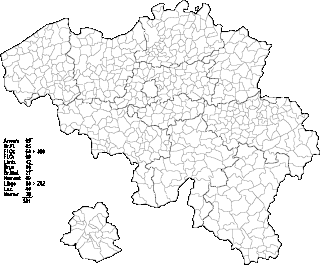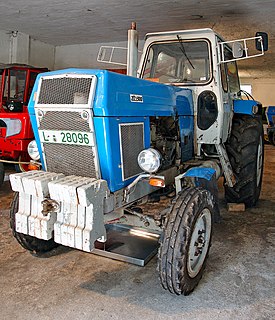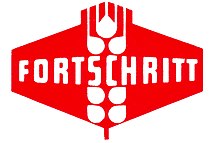
Bischofswerda is a small town in Germany at the western edge of Upper Lusatia in Saxony.

The Party for Freedom and Progress is a regional liberal political party in the German-speaking Community of Belgium.
This article gives an overview of liberalism in Belgium. It is limited to liberal parties with substantial support, mainly proved by having had a representation in parliament. The sign ⇒ denotes another party in that scheme. For inclusion in this scheme it is not necessary that parties labeled themselves as a liberal party.
Case IH is an American agricultural machinery manufacturer. It was created in 1985 when Tenneco bought selected assets of the agricultural division from International Harvester and merged it into its J.I. Case Company .Today Case IH is owned by CNH Industrial.

Kirschau is a village and a former municipality in Upper Lusatia in the district of Bautzen in Saxony in Germany. Since 1 January 2011, it is part of the town Schirgiswalde-Kirschau. It is situated in a region called Lausitzer Bergland in the valley of the Spree and the Pilke, between the "Mönchswalderberg" and the "Lärchenberg" and belongs in respects of administration to the district of Bautzen.

The Belgian provincial, municipal and district elections of 2000 took place on Sunday October 8, 2000. The electors elected the municipal councillors of 589 cities and towns as well as the ten provincial councils. Additionally, the newly established district councils in the city of Antwerp were elected for the first time.
The 1953–54 DDR-Oberliga was the fifth season of the DDR-Oberliga, the first tier of league football in East Germany.
The 1955 DDR-Oberliga was the seventh season of the DDR-Oberliga, the first tier of league football in East Germany. After the 1954–55 season the league played a transition round in autumn 1955, followed by five seasons, until 1960, where it played in the calendar year format. From 1961–62 onwards the league returned to its traditional format.
Malchower SV is a German association football club based in Malchow, Mecklenburg-Vorpommern, currently playing in the NOFV-Oberliga Nord. The club was established on 26 July 1990, but traces its tradition back to the city's earliest sides.
Stefan Gieren is a German film producer and writer. On January 24, 2012, he was nominated for an Academy Award for the film Raju. His nomination was shared with Max Zahle. He received a Student Academy Award twice - in 2011 for the film Raju and in 2016 for the film Ayny. In 2019 he received the German Film Award (Lola) in Gold for his film Fortschritt im Tal der Ahnungslosen.
Weissenfelser Handballverein '91 e.V. is a German women's handball club from Weissenfels. It was founded in 1991, following the reunification of Germany, from the fusion of local clubs Fortschritt and Vorwärts, and it currently plays in the Saxony-Anhalt regional category.

The Bischofswerdaer FV 08 is a German association football club from the town of Bischofswerda, Saxony.

ZT 300 is a series of 20 kN agricultural tractors, produced from 1 September 1967 to 1984 by the VEB Traktorenwerk Schönebeck. It succeeded the RS14 Famulus series, and unlike the Famulus, the ZT 300 series was sold under the brand name Fortschritt. ZT 300 refers both to the initial ZT 300 model, and the ZT 300 series. In total, 72,382 units of the ZT 300 series were made. The model with the highest production figure was the ZT 303, which was introduced in 1972. It features an automatic all-wheel-drive system; in the early 1980s, it cost 81.000 Mark. Starting in 1983, the ZT 300 series was succeeded by the ZT 320.

Fortschritt ZT 320 is a series of agricultural tractors made by the East German manufacturer VEB Traktorenwerk Schönebeck. It was produced from 1983 to 1990, and succeeded the ZT 300 series. Unlike its predecessor, the ZT 320 series came in only two models, the rear-wheel drive ZT 320, and the all-wheel drive ZT 323.

Gabriele Hiller-Ohm is a German politician (SPD). She has been a member of the Bundestag since 2002. Since 2014, she has been the SPD parliamentary group's spokesperson for tourism policy.

The S-4 «Stalinets», is a self-propelled combine harvester, made by several different combine harvester plants in the former Soviet Union, from 1947 until 1955. In 1955, the modernised variant, called the S-4M, was introduced; it was put out of production in 1958. In total, 29,582 units were built. In former East Germany, the S-4 combine was built under licence by the IFA as the Fortschritt E 170 series, from 1954 until 1967. Unlike the original S-4, which is powered by an otto engine, the Fortschritt E 170 series combines were all powered by a diesel engine, and some of them came with a chaff waggon rather than a straw waggon.

The Fortschritt E 512 is a self-propelled combine harvester that was made by the East-German manufacturer VEB Mähdrescherwerk Bischofswerda/Singwitz, and sold under the Fortschritt brand. It is the first Fortschritt combine harvester that has been solely developed in the GDR. The E 512 succeeded the Fortschritt E 170 series. At the time of its introduction in the late 1960s, the E 512 was a modern, sought-after combine harvester that could compete well with high-performance combines made in Western countries, such as the Clayson 140 and the Claas Senator. In total, 51,412 units were made from 1968 until 1988, which makes the E 512 the East German combine harvester with the highest production figure.

The Fortschritt E 514 is a self-propelled combine harvester, that was made by the East-German manufacturer VEB Mähdrescherwerk Bischofswerda/Singwitz in Singwitz, and sold under the Fortschritt brand. It is the successor to the Fortschritt E 512, which it did not manage to replace – the E 514 was produced alongside the E 512 from 1982 until 1988.
The Fortschritt E 510 was a self-propelled combine harvester, developed in the early 1960s by the East-German Fortschritt combine. It was a heavy modification of its predecessor, the Fortschritt E 170 series. Several E 510 combines were made for testing purposes; however, the tests which were conducted in the 1963 harvesting season showed that, the E 510 was no improvement over the E 170 series. Despite having developed the E 510 to a point where it was ready to go into series production, the E 510's series production never commenced, and the E 510 was cancelled. Instead, Fortschritt developed a completely new combine harvester, the Fortschritt E 512.

The Fortschritt E 162, also known as the LBH 52 Kombinus, is a tractor-drawn combine harvester, made by the East-German manufacturer VEB Mähdrescherwerk Boschofswerda/Singwitz in Singwitz, from 1952 until 1956. In total, 54 were built. The E 162 proved to be an unreliable combine, and it was soon replaced by the Fortschritt E 170 series.














